 Petzlover
Petzlover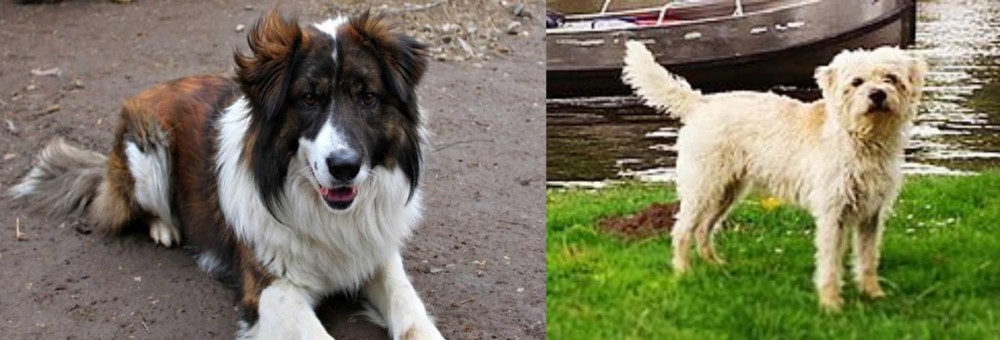 Aidi is originated from Morocco but Dutch Smoushond is originated from Netherlands. Aidi may grow 18 cm / 8 inches higher than Dutch Smoushond. Aidi may weigh 14 kg / 31 pounds more than Dutch Smoushond. Aidi may live 3 years less than Dutch Smoushond. Both Aidi and Dutch Smoushond has almost same litter size. Aidi requires Low Maintenance. But Dutch Smoushond requires Moderate Maintenance
Aidi is originated from Morocco but Dutch Smoushond is originated from Netherlands. Aidi may grow 18 cm / 8 inches higher than Dutch Smoushond. Aidi may weigh 14 kg / 31 pounds more than Dutch Smoushond. Aidi may live 3 years less than Dutch Smoushond. Both Aidi and Dutch Smoushond has almost same litter size. Aidi requires Low Maintenance. But Dutch Smoushond requires Moderate Maintenance
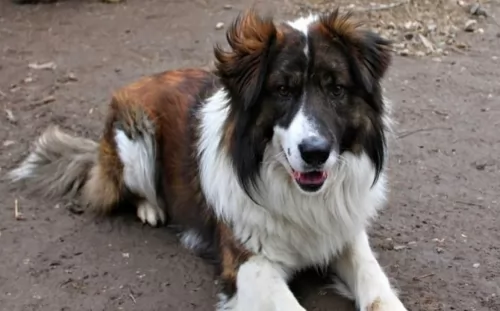 Aidi dog is also known as Berber dog. It originates from Marocco, where it has been kept to protect people from wild animals, strangers, and predators. It is considered that this breed has been utilized by the Barber tribe that is why it has a name Barber dog. Aidi has recently been protected by a club to keep its purity of the breed.
Aidi dog is also known as Berber dog. It originates from Marocco, where it has been kept to protect people from wild animals, strangers, and predators. It is considered that this breed has been utilized by the Barber tribe that is why it has a name Barber dog. Aidi has recently been protected by a club to keep its purity of the breed.
 The Dutch Smoushond, known also as the Hollandse Smoushond ,Hollandse Herdershond
The Dutch Smoushond, known also as the Hollandse Smoushond ,Hollandse Herdershond
or Dutch Ratter is a small to medium sized dog. The Smoushondenclub was formed in 1905 as it was thought that the breed was dying out and they wanted to register the dog as a purebred breed.
It is believed that the dog’s origins may have to do with the Schnauzer breed. It was in 1973 that a number of breeders looked to reconstruct the breed, using Border Terrier crosses.
Today this rare breed is popular in the Netherlands, but not particularly well known anywhere else. In 2001 it was recognized by the Federation Cynologique Internationale as well as by the United Kennel Club in the United States.
Although the dog was once a skilled ratter, most Dutch Smoushond are kept as companion dogs.
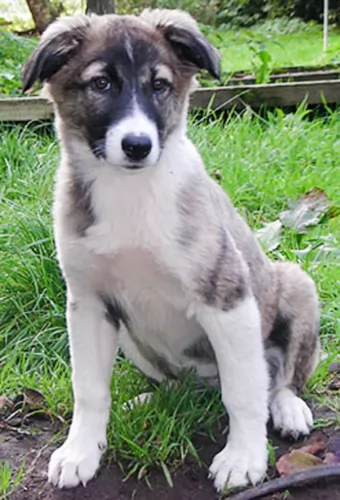 Aidi dog originate country is Morocco.
A weight of the Aidi dog is 23-25kg while the height is 53-61cm. Female dogs are a little smaller than average males.
Lifespan variates from 10-12 years, but it depends on every individual.
Litter Size of Aidi is 5-8 puppies.
Other Names for Aïdi are Atlas Mountain Dog, Atlas Shepherd Dog, Berber Dog, Chien de l'Atlas, Chien de Montagne de l'Atlas, Kabyle Dog.
Aidi dog originate country is Morocco.
A weight of the Aidi dog is 23-25kg while the height is 53-61cm. Female dogs are a little smaller than average males.
Lifespan variates from 10-12 years, but it depends on every individual.
Litter Size of Aidi is 5-8 puppies.
Other Names for Aïdi are Atlas Mountain Dog, Atlas Shepherd Dog, Berber Dog, Chien de l'Atlas, Chien de Montagne de l'Atlas, Kabyle Dog.
 The Dutch Smoushond is a small to medium sized dog breed related to the Schnauzer- and Pinscher breed. He stands at about 35 to 43cm at the withers and weighs about 10kg.
The Dutch Smoushond is a small to medium sized dog breed related to the Schnauzer- and Pinscher breed. He stands at about 35 to 43cm at the withers and weighs about 10kg.
He has a rough, shaggy, wiry coat which is waterproof and which is a yellowish or straw color. You’ll notice that the hair around the face is long and fairly straight and forms a beard, eyebrows, and moustache, giving him wise, know-it-all look.
The forelegs are also feathered. He may well give the impression of being ungroomed and untidy with his different length hair. He has floppy ears, the eyes are small and dark, the nose black and the tail is long and feathery, hanging limply when the dog is relaxed.
Easy going, friendly and social, the Dutch Smoushond is a fairly quiet dog, but because he is intelligent and alert, he makes a good watchdog.
When not guarding you, he is cheerful and entertaining. He is an adaptable dog, being able to settle down to life in the city or in the countryside, getting on well with other pets in the home as well as with children.
He is a dog who wants to please, so training him isn’t going to prove difficult. He’ll do well with this training as well as socialization as he becomes obedient, easy-going and relaxed around strangers.
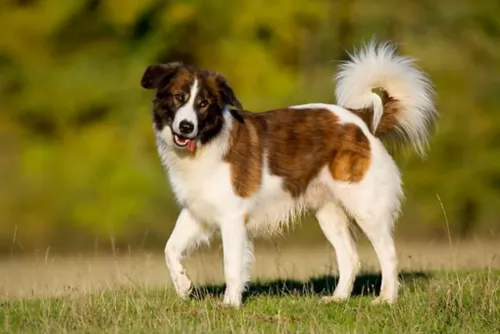 Aidi is an active dog who loves spending time outside in large space. They are not recommended for people who live in the apartments. They are very protective dogs, so they will be a perfect guard dog for large houses.
Aidi is an active dog who loves spending time outside in large space. They are not recommended for people who live in the apartments. They are very protective dogs, so they will be a perfect guard dog for large houses.
They are amazing with children. Aidi is a very gentle to small kids, and they tend to bond very quickly. It is very important to socialize them on time because they tend to be aggressive towards other animals and people if not properly trained. The best way to socialize them is to spend time with other pets since the early age.
Training of the Aidi might be tricky because it requires constancy and patience. It is also very important to be a firm but without any aggression towards a dog. Awarding and positive training is a must with this breed.
One of the most important things is that Aidi needs to spend a lot of time being active. They need a lot of space to be comfortable even though they do not need a lot of running.
They are very smart dogs who come from a history of guarding dogs, so proper socialization is a must. Aidi is not recommendable for the first time owners. They need a lot of practice and training to be a perfectly good pet.
 The Dutch Smoushond, also known as the Dutchie, Dutch Ratter or Dutch Terrier may once have been used as a vermin hunter, but today this terrier dog shares some of the characteristics of the more popular terriers. He may have been a hunter in his day, but more recently he is used as a reliable companion dog.
The Dutch Smoushond, also known as the Dutchie, Dutch Ratter or Dutch Terrier may once have been used as a vermin hunter, but today this terrier dog shares some of the characteristics of the more popular terriers. He may have been a hunter in his day, but more recently he is used as a reliable companion dog.
He tends to be a bit of a barker, particularly when he isn’t getting attention.
He gets on well with other animals in the home as well as with children, but he will need to be trained and socialized. He is lively, friendly and social and is a dog who becomes devoted to his human family.
 These dogs are a healthy breed, but nonetheless there are are some health problems that can crop up occasionally.
These dogs are a healthy breed, but nonetheless there are are some health problems that can crop up occasionally.
Ear- and eye infections and joint problems are always a major concern, even in young dogs. Bad diet, old age and being overweight can all contribute to your dog developing joint pain. Joint pain symptoms can include -
difficulty with sitting or lying down
limping or even holding a leg up off the ground
lethargic to take part in any activities
Take your pet to the vet who will examine your pet and perhaps request x-rays.
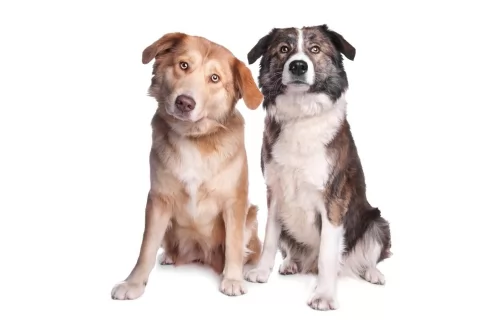 Feeding Aidi dog depends on the activity and size of each individual. Overall, for a medium-sized dog with average activity 2-2.5 cups of high-quality food would be enough, but if your dog is a very active dog, you should give him extra food. They love eating, so giving your dog healthy fruit and vegetables would be a very nice treat and addition to dry food. Olive oil is also very good for your dog’s coat and digestive system.
Feeding Aidi dog depends on the activity and size of each individual. Overall, for a medium-sized dog with average activity 2-2.5 cups of high-quality food would be enough, but if your dog is a very active dog, you should give him extra food. They love eating, so giving your dog healthy fruit and vegetables would be a very nice treat and addition to dry food. Olive oil is also very good for your dog’s coat and digestive system.
Puppies need to have more meals per day, so dividing 3-4 cups of food into 3-5 meals per day should be a good amount of food for your puppy. Also, regular intake of vitamins and minerals would do a lot of benefits for the health of your dog.
Aida is a very easy dog for grooming. They have a coat that really needs a little extra attention. Few brushing on a monthly basis with an occasional bathing couple of times a year would be enough to have a perfectly groomed dog. They don’t shed a lot, so little extra brushing during the shed period is all you need.
 The Dutch Smoushond is basically an easy care breed, and it won’t do to try and tame the coat as the dog has a naturally unkempt look.
The Dutch Smoushond is basically an easy care breed, and it won’t do to try and tame the coat as the dog has a naturally unkempt look.
You can brush him twice a week to keep the coat free of matting and to remove loose hairs. The Dutch Smoushond may require the hair being plucked and a professional groomer can do this.
At the same time, the groomer can remove excess hair from the ears and also clean your dog’s teeth. This is of critical importance as bad teeth can lead to a host of health problems.
Get into the habit of brushing your pet’s teeth 2 or 3 times a week, making use of special pet approved toothbrush and toothpaste.